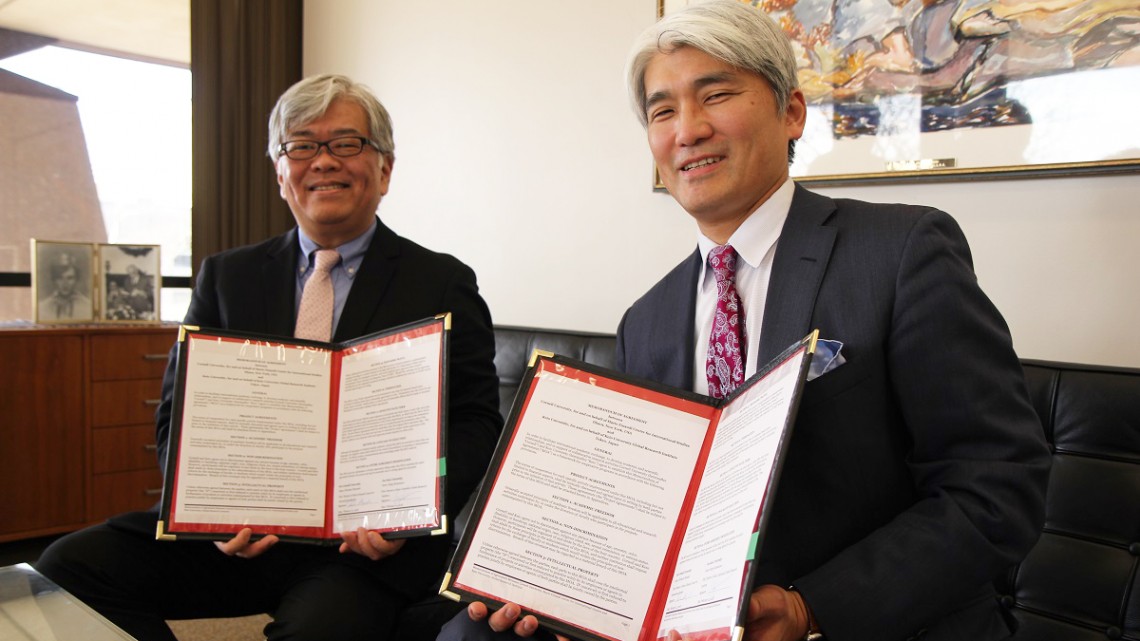
Keigo Komamura, vice president of Keio University, left, and Hiro Miyazaki, director of the Einaudi Center, signed a memorandum of agreement on Feb. 13.
Einaudi Center, Keio University join forces on cyber research
By Jonathan Miller
As director of Cornell’s Mario Einaudi Center for International Studies, anthropologist Hiro Miyazaki has been working to build collaborative relationships across disciplinary, institutional, linguistic and national borders.
As vice president of Keio University in Tokyo and director of the new Keio Global Research Institute, legal scholar Keigo Komamura has been doing exactly the same thing.
On Feb. 13, after Komamura and a six-person delegation from Keio took part in a two-day workshop at Cornell on privacy and surveillance, he and Miyazaki signed an agreement cementing what they hope will be a fruitful partnership.
It begins with a multidisciplinary project on cybersecurity, a field with social, legal, political and technical dimensions.
“Like Cornell, Keio University has strengths in many different areas,” Miyazaki said. “Also like Cornell, Keio wants to have an impact on the world. We see great opportunities for teamwork on a range of issues and projects.”
Miyazaki said the agreement is part of a larger effort to partner with other universities rather than compete with them for intellectual and financial resources.
Komamura reported that his 160-year-old university is moving in the same direction. Boosted by a major grant from the Japanese government, which named it a “top global university,” Keio has committed to teaming up with universities in other countries on solving global problems.
The institute Komamura heads was established in November 2016 to tackle challenges related to longevity, security and creativity. “Each of these requires input from scholars in the sciences, the social sciences and the humanities,” he said.
The institute will soon open a Cyber Civilization Research Center, where scholars on cybersecurity, digital humanities, computer science, artificial intelligence and other subjects can work together.
The privacy workshop was led by Fred Schneider, chair of the computer science department, and Rebecca Slayton, associate professor of science and technology studies and associate director of the Judith Reppy Institute for Peace and Conflict Studies. Discussions touched on topics ranging from the science of internet censorship to the differences between American, Japanese, Chinese and European conceptions of privacy. Participants included engineers, legal scholars, historians, sociologists, anthropologists and policy experts. In addition to faculty members and graduate students from Cornell and Keio, guests joined from Columbia, Georgia Tech and Indiana University. The organizers expect to produce an e-book based on the proceedings.
Jiro Kokuryo, a vice president of Keio and a professor of policy management, said he hoped the ongoing work would lead toward “a common agenda and a common understanding of how people address these issues from different disciplinary perspectives, and across the water.”
Kokuryo said he was impressed by Cornell’s “hybrid nature,” coupling a commitment to world-class scholarship with a strong public service mission. “You can clearly see that it’s a rooted culture,” he said. “That’s exactly the spirit we’d like to promote at Keio.”
Jonathan Miller is associate director for communications at the Einaudi Center.
Media Contact
Get Cornell news delivered right to your inbox.
Subscribe
